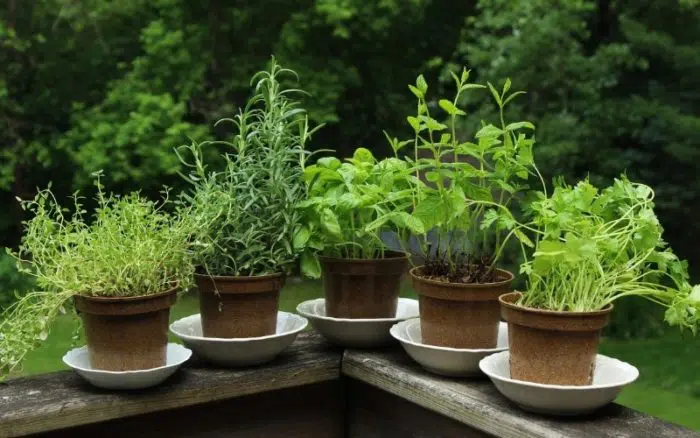When planning your vegetable garden, it’s always a great idea to think about pests and common fungal diseases that impact the plants you’re going to be growing.
I love cilantro, so I’ll be planting it all over the place in my garden. It seems to do well with most other plants, but which will it actually help?
Are you supposed to be planting your cilantro all in one area? Do you interweave them with plants they attract beneficial insects for? It can be confusing, especially for a beginner or newer gardener.
The Most Common Cilantro Companion Plants
Some of the best companion plants for cilantro are tomatoes, anise, and dill. But there are quite a few others that don’t get as much attention from gardeners.
As I’m planning a large garden, there are a lot of things to think about – and one of the big ones is which herbs to plant next to each other.
I had to do quite a bit of research to see which herbs that grow well together and which don’t. This page is a compilation of me trying to figure out what will grow well near my cilantro plants.
Common Issues With Cilantro
Bacterial Blight
Powdery Mildew
Common Problems Pests That Impact the Cilantro Plant
Companion planting is a two-way street. Plant A helps Plant B, and/or Plant B helps Plant A.
Because of that, I like to start with the problems that cilantro has, and that will help us understand which herbs or plants will help cilantro.
Cilantro plants tend to attract aphids, spider mites and snails.
1. Aphids
Aphids, the glitter of the garden – they’re everywhere, they multiple by the minute, and they’re impossible to get rid of. So I’ll be keeping this list handy as I plan out my garden. Companion planting can help with these problems.
Plants that repel Aphids
- Catnip
- Chives
- Dill
- Fennel
- Garlic
- Leeks
- Marigolds
2. Japanese Beetles
There are a few plants that Japanese beetles stay away from in the garden. The scent of these is strong and doesn’t taste good to the beetles.
These are the plants that repel Japanese beetles:
- Catnip
- Chives
- Garlic
- Larkspur
- Leeks
- Marigolds
- Onions
- White Chrysanthemum
- White Geraniums
- Tansy
17 Of the BEST Cilantro Companion Plants
Herbs like basil, cilantro, dill, and parsley provide shelter and food for predatory insects and beneficial parasitic insects, so they can help plants that need those pollinators and insects to thrive.
Anise
The Anise herb likes the same growing conditions as cilantro, and is a good companion plant for cilantro as they help each other germinate better.
Basil
Basil is a good companion plant for cilantro as they both take up less room and
Caraway
Dill
Dill enjoys similar growing conditions to cilantro, making them great companion plants.
Potatoes
Potato plant growth is usually hindered by Colorado potato beetles, but luckily cilantro is a great option to help keep them away from your plants. This makes cilantro and great companion plant for potatoes.
Spinach
Cilantro can help repel some of the pests that eat leafy vegetables, including spinach so these two are great companion plants.
Sunflowers
Sunflowers grow pretty tall and they can provide a great amount of shade for your cilantro plant.
Tomatoes
Planting cilantro near tomatoes can improve the flavor of your fruits, and help repel some of the pests and tomato worms. Make sure not to plan legumes nearby as they both use up a lot of nitrogen and can cause slower growth and stunted tomato yields.
What NOT to Plant Near Cilantro
While cilantro does well with many garden plants, there are a few you shouldn’t plant with cilantro.
Fennel
If you were to plant fennel and cilantro together, the fennel can suffer.
These Herbs
Lavender, rosemary, and thyme are plants like to grow in drier soil that drains a lot more than cilantro enjoys. They can be planted nearby, but make sure they have the soil they enjoy more.

What is Companion Planting?
Companion planting in my eyes is figuring out which plants and herbs to put near each other in the garden (and which to keep far apart) based on the insects they attract, as well as the soil conditions they promote.
A plant that generally grows well in sandy soil won’t do as well next to a plant that needs a ton of nutrients and a good potting soil. Some plants in the garden like extra sunlight, while some do well with some shade.
What Are the Benefits of Companion Planting?
Organic Pest Control
Companion planting is a good way to control garden pests in an organic way. By planting an herb that repels asparagus beetles, a common hindrance to asparagus plants, you’re able to better control that beetle population and have a more bountiful asparagus harvest.
Attracting Beneficial Insects
Cilantro can help because it attracts beneficial insects and pollinators, such as bees and butterflies to your garden. These can help companion plants grow larger and stronger.
Impacting Flavors
This can be both a pro and a con for cilantro companion planting. While cilantro can help tomatoes, peppers, and potatoes taste better, it can make some others taste a little strange.
So you’ll want to keep this in mind when deciding what to plant cilantro near and what grows well together in your vegetable and herb garden.
Cilantro Companion Plants
Cilantro is a great herb to grow and enjoys being planted with lots of others. It can help repel pests and attract beneficial insects with its flowers, but does have specific growing conditions. Planting cilantro in pots is a great way to plant it nearby other herbs like lavender, but since they enjoy different growing conditions, the pots allow you to give each the right soil.


